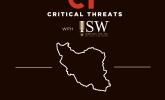Iran Crisis Update, December 5
December 5, 2022 - ISW PressProtest activity and strikes in Iran increased significantly on December 5—in line with the calls from protest coordinators and organizations for countrywide demonstrations until December 7. These strikes are the most reported in a single day since CTP began publishing daily updates on September 28. This dramatic increase in public expressions of dissent will likely continue until at least December 7. The latest protest activity and strikes highlight once again the capability of the protest coordinators and organizations to generate countrywide demonstrations against the regime—even after a few days of reduced protests and strikes.








